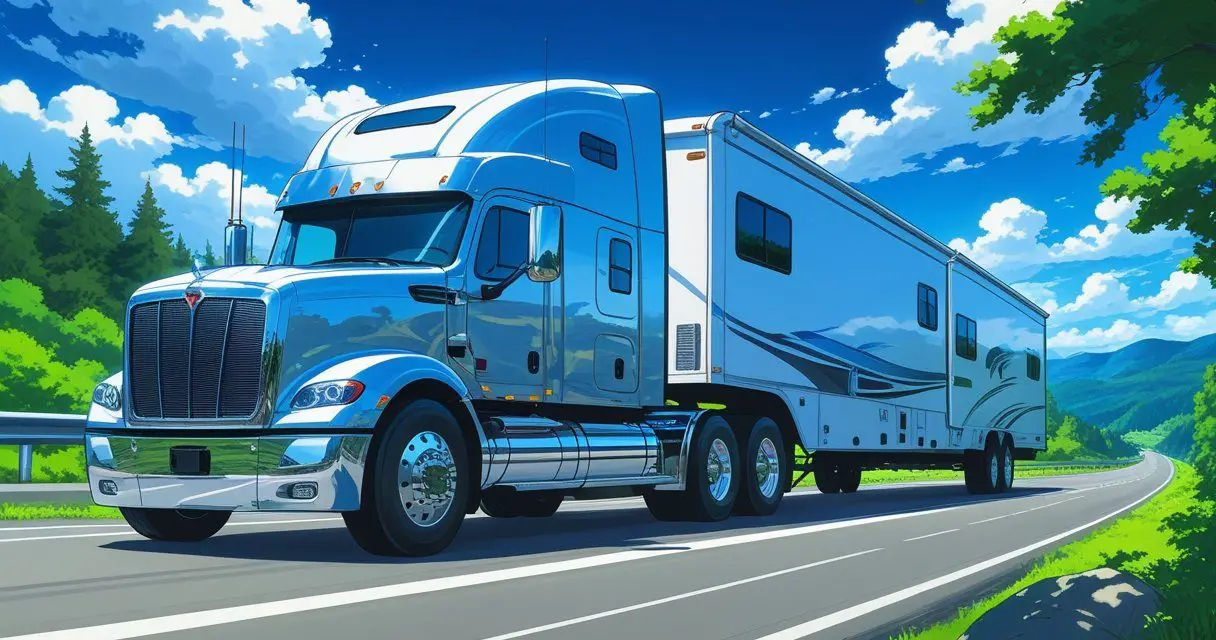Buying an RV is a dream for many, but that dream can quickly turn into a nightmare if you’re misled about towing capacity. Too many buyers trust dealerships to give honest advice, only to find out later that their vehicle can’t safely tow the RV they just bought. The result? Overloaded vehicles, voided warranties, insurance headaches, and even lawsuits. While some dealerships are forthright, others will say almost anything to close a sale—including stretching the truth about what your truck or SUV can handle. In this article, we’ll break down the most common towing capacity tricks, show you how to spot them, and give you the tools to protect yourself from becoming the next cautionary tale.
1. The “Dry Weight” Deception
Dealers often highlight the RV’s “dry weight”—the weight of the trailer without any cargo, water, propane, or personal gear. This number can be hundreds or even thousands of pounds lighter than the actual weight you’ll be towing once you load up for a trip. According to real-world accounts, families often use every bit of their trailer’s full cargo carrying capacity, sometimes adding 4,000 pounds or more to the dry weight.
Table: What Dry Weight Misses
| Item | Average Weight Added |
|---|---|
| Water (full tank) | 300 lbs |
| Propane | 60 lbs |
| Food & Supplies | 200-400 lbs |
| Camping Gear | 200-600 lbs |
| Bikes, Toys, Extras | 100-800 lbs |
Would you like to save this article?
So, when a dealer says, “Your truck can tow this, no problem!”—ask if they’re talking about dry weight or real-world weight. Otherwise, you might find your “lightweight” trailer is about as light as a Thanksgiving dinner after seconds.
2. Ignoring Gross Combined Weight Rating (GCWR)
Some dealerships focus only on your vehicle’s tow rating, ignoring the Gross Combined Weight Rating (GCWR)—the maximum safe weight of your loaded vehicle plus the loaded trailer. Exceeding GCWR can be dangerous and may void your warranty or insurance coverage. Many buyers don’t realize that adding passengers, cargo, and even a full tank of gas to your tow vehicle eats into your towing capacity.
GCWR Calculation Example:
- Truck GCWR: 15,000 lbs
- Truck curb weight (empty): 6,000 lbs
- Passengers & cargo: 800 lbs
- Remaining towing capacity: 8,200 lbs
If your “9,000 lb” trailer is actually 10,500 lbs loaded, you’re already over the limit. It’s like trying to sneak a bowling ball into your carry-on bag—sooner or later, someone’s going to notice.
3. The “Half-Ton Can Tow Anything” Myth
Salespeople sometimes claim that a half-ton pickup can tow massive fifth wheels or travel trailers. This is not just misleading—it’s dangerous. There are documented cases of dealers telling buyers their half-ton trucks could tow 14,000-pound trailers, despite the truck’s much lower actual rating. The reality is, most half-ton trucks are rated for 7,000–10,000 lbs, depending on configuration.
Chart: Typical Tow Ratings by Truck Class
| Truck Class | Typical Max Tow Rating |
|---|---|
| Half-Ton | 7,000–10,000 lbs |
| Three-Quarter | 12,000–15,000 lbs |
| One-Ton | 15,000–20,000+ lbs |
If your dealer says your half-ton can “tow anything on the lot,” just remember—so can a toy Tonka truck, if you believe hard enough.
4. Waivers and Shifting Liability
Some dealers have buyers sign waivers stating they understand the risks of towing over capacity, effectively shifting all liability to the customer. This means if you have an accident or damage your vehicle, you could be on the hook—not the dealer. There’s no federal law requiring dealers to check if your vehicle is suitable for the trailer, so the burden is on you to know your limits.
Bullet Points: What Signing a Waiver Means
- Dealer is not responsible for mismatched towing
- Your warranty and insurance may be voided
- You could be liable in an accident
It’s the legal equivalent of “Don’t blame us if you try to tow a house with a bicycle.”
5. Glossing Over Payload and Hitch Weight
Dealers may talk about towing capacity but ignore payload and hitch weight. The tongue (hitch) weight of a trailer is typically 10–15% of the trailer’s loaded weight, and this counts against your truck’s payload capacity. Overloading the rear axle can cause poor handling, tire blowouts, or frame damage.
Example:
- Trailer loaded weight: 8,000 lbs
- Tongue weight (12%): 960 lbs
- Truck payload rating: 1,400 lbs
- Add passengers, gear, and you’re maxed out—or overloaded.
If you ignore payload, your truck could end up squatting lower than your neighbor’s pants at a plumber’s convention.
6. “It’s Fine, Everyone Does It” Sales Tactics
Some salespeople downplay concerns by saying “everyone tows like this” or “you’ll never actually fill it that full.” In reality, most RVers end up using every pound of their cargo capacity, especially families. Overloading is common and can lead to breakdowns, accidents, and denied insurance claims.
Trusting “everyone does it” is like trusting your uncle’s fishing stories—fun until you’re the one that gets caught.
7. How to Protect Yourself: Do the Math, Not Just the Sales Pitch
The best way to avoid towing capacity lies is to do your own research. Always check your vehicle’s owner’s manual, look up the actual tow and payload ratings, and calculate loaded weights—including all gear, water, and passengers. Don’t rely on the dealer’s word alone.
Checklist: Steps to Verify Towing Capacity
- Check your vehicle’s tow and payload ratings (door sticker/owner’s manual)
- Calculate loaded trailer weight (not just dry weight)
- Add up all cargo, water, and gear
- Factor in tongue weight and payload
- Ask for written confirmation from the dealer
If you do the math yourself, you’ll avoid being the star of the next “RV dealership horror story”—unless you’re auditioning for a reality show called “Towing Disasters.”
Sources:
- https://www.jaycoowners.com/threads/lawsuit-for-dealer-selling-too-heavy-tt-for-tv.519996/
- https://www.reddit.com/r/RVLiving/comments/zw079z/are_rv_dealers_required_to_check_the_tow_vehicle/
- https://www.rvnetwork.com/topic/122103-rv-dealer-sued-for-false-claims/
- https://www.youtube.com/watch?v=PGpuMjgAEVs
- https://publications.ids-astra.com/view/942782130
- https://emulent.com/blog/the-seo-playbook-for-rv-dealers-cheat-sheet-to-increase-sales-leads/
- https://www.avvo.com/legal-answers/the-year-of-the-rv-we-purchased-was-misrepresented-4289151.html
- https://www.carbuyingtips.com/rv/rv2.htm
- https://emulent.com/blog/digital-marketing-strategy-for-rv-dealers/







